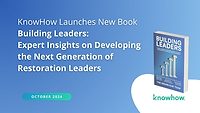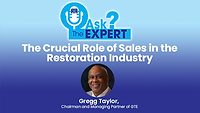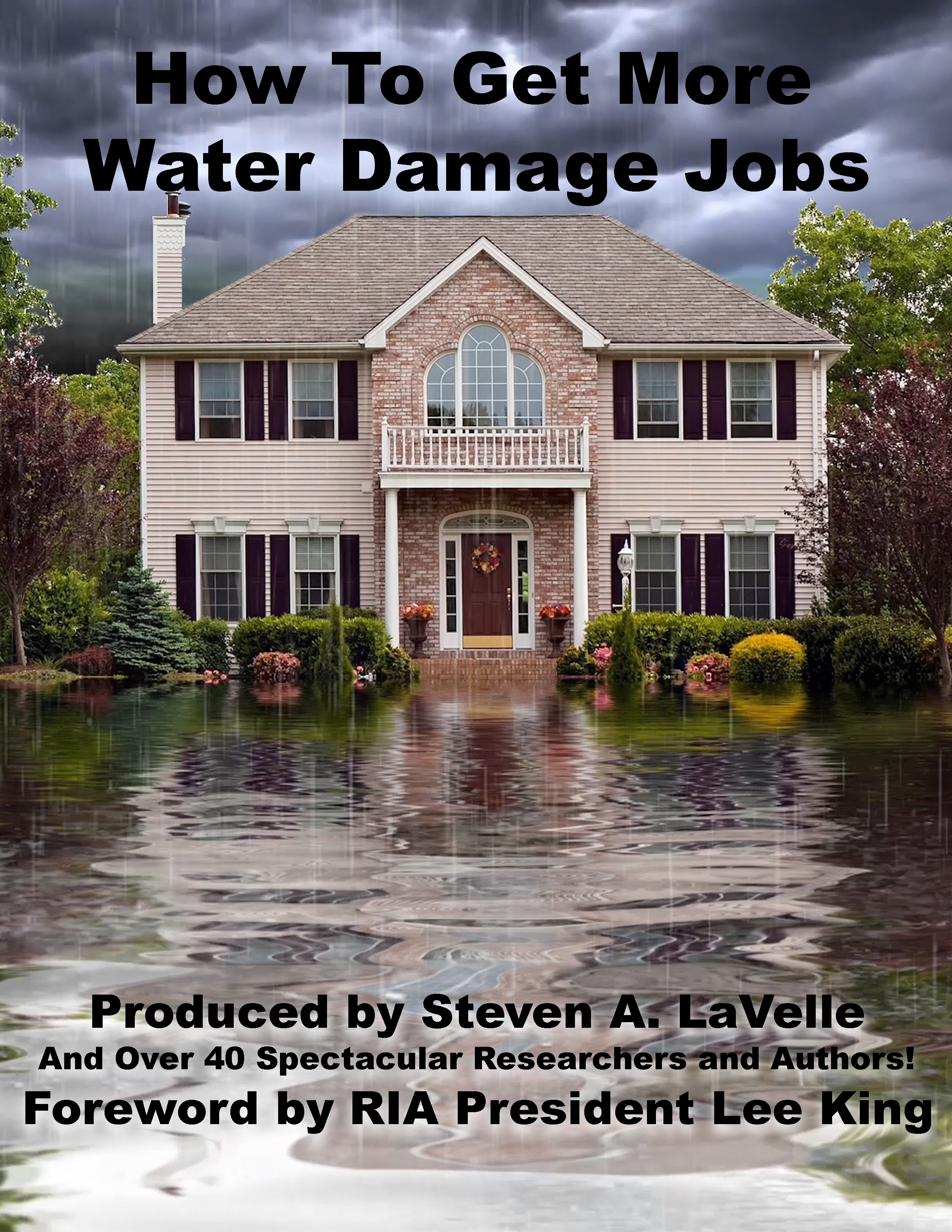Julie Johnson on the Role of Love and Care in Building Leaders
Learn how Julie Johnson's unique approach to leadership, rooted in love and care, has transformed Alpha Omega Disaster Restoration and shaped future industry leaders.

Image provided by KnowHow.
Welcome back to “Building Leaders,” a brand new series from KnowHow that explores how today’s restoration leaders are setting up their teams for success in the future. Inspired by our latest book, Building Leaders, each interview features in-depth conversations—in text and audio—with industry leaders actively preparing their teams to tackle the leadership challenges of tomorrow.
If you want to stay ahead and ensure your team is ready for tomorrow’s challenges, you’re in the right place. Expect real advice, actionable insights, and plenty of takeaways to help you build a team ready for whatever comes next.
Ready to build the leaders of tomorrow?
Leadership is often romanticized as a smooth journey from skill to skill and from one milestone to the next. But the reality, especially in the restoration industry, is far more murky, filled with unexpected challenges and those rare, beautiful moments when everything clicks into place. Julie Johnson, the former owner of Alpha Omega Disaster Restoration, has experienced both ends of this spectrum. Her approach to leadership development might surprise you, but her impact on her team and community leaves no doubt about the effectiveness of her methods.
From Playing Desk to Co-Owning Alpha Omega
Julie Johnson’s entrepreneurial spark was ignited in childhood. “Growing up, my father was an entrepreneur,” she recalls. “But I never thought I’d own a business. My mom tells me I’d play desk with her at work, using old deposit slips as my paperwork. Maybe it was destined to be.”
But Julie’s journey to the restoration industry wasn’t straightforward. “I didn't even know what a restoration company was,” she admits. After marrying her husband, Willie, who took a job with a local restoration company, everything changed. Willie fell in love with the work because of the idea of helping people. When Hurricane Katrina hit, he proposed the bold idea of joining a national disaster restoration team heading to New Orleans, leaving behind job security for the uncertainty of a new venture.
Julie’s first reaction was, “No, wait, what?” She admits it took some time and convincing to embrace the idea the way her husband did.
“I am a planner. I like to have all of my decks in order. So I had to take some time to get used to that idea,” she explains. “And it was a God thing, honestly, because it was meant to be, and my heart went from ‘heck no’ to ‘okay, we can do this.’”
Wille returned from New Orleans the next year and, together with Julie, started Alpha Omega Disaster Restoration out of their garage with just two employees and a makeshift office. “We were jack of all trades,” Julie says. They did everything from painting to bookkeeping and created their jobs for themselves. But along the way, they also had to learn the very real principles of running a business.
Curious to hear more from Julie? Click on the video below to catch the full discussion!
Building Alpha Omega Restoration with Growth and Intentionality
One of the first guiding principles Julie and Willie established for their business was deliberate growth and financial responsibility.
“We decided not to borrow more than we could repay,” Julie says. “That discipline allowed us to grow organically—buying equipment as we could afford it and moving step-by-step from a garage to a permanent location.”
Their financial discipline wasn’t just about saving dollars and cents; it was also about shaping the company’s culture as well.
“We prioritized paying vendors and employees on time,” Julie explains. In the restoration industry, cash flow ebbs and flows. However, being intentional about cash reserves and collections kept Julie’s team and partners confident in them because they never missed a payment.
Creating a Culture of Love and Care at Alpha Omega
After building a solid foundation of financial responsibility, Julie took the next step of creating a great team culture. As she explains, “I didn't walk in every morning asking ‘how much money am I going to make today?’"
Instead, she focused on genuinely caring for her team members. Practically, this looked like mentoring when necessary, celebrating success when the opportunity presented itself, empathizing when people were hurting, and just doing life side by side with the team.
The result of this was a culture of care, loyalty, and plenty of team camaraderie at Alpha Omega.
“People would come to work for us and then stay for 10 to 15 years because they just loved being part of it,” Julie says. “How else do you explain people saying, ‘This is great’ while cleaning sewage out of a crawlspace?” she jokes.
Balancing Love and Care with Accountability Systems
Julie faced the challenge of scaling her values with Alpha Omega's growth. To achieve this, she relied on intentionality and accountability. Julie’s strategies included:
-
Weekly Meetings and Clear Expectations. Consistent follow-ups and accountability systems ensured that values remained intact as the company grew. Weekly meetings also allowed Julie and the team to clearly understand where everyone stood and provided an avenue for questions.
-
Job Budgeting. Tools like budget versus actual spreadsheets and work-in-progress tracking helped the team stay accountable. Every team member was expected to fill in a preliminary budget for their project, and they were encouraged to track real-time costs as the project progressed.
-
Empowerment Through Responsibility. Julie wanted her team to understand how their work contributed to the company’s success. Everybody knew their part and how it contributed to the business. Project managers were responsible for ensuring their project flowed and was on track. Essentially, everyone knew what piece of the pie they were responsible for, the numbers of the project, and the goals, and they were prepared to discuss all of these at team meetings. This approach ensured that each individual felt a sense of ownership over their role.
Julie Johnson on What It Takes to Build Leaders
Julie’s commitment to leadership didn’t just end with her role. In fact, she was deeply invested in building the next generation of leaders. Julie did this by:
-
Building Trust Through Vulnerability: For Julie, vulnerability is integral to building trust because it helps people relate to you, especially as a leader. As Julie describes it, the perfect balance is healthy vulnerability without complaining or oversharing. “I just share in a way that makes team members say, ‘Oh gosh, they're just like me’ because I can also relate to that struggle.” By sharing struggles and learning processes, Julie says leaders create a safe environment for their team members to do the same.
-
Growing Through Correction: At Alpha Omega, correcting team members was not about pointing out mistakes but helping people grow. “Correction was from a place of genuine care and concern for the person, not necessarily about the undesired outcome you might be experiencing,” Julie explains. Fundamentally, treating people how you want to be treated encourages growth without the fear of making mistakes.
-
Serving Before Leading: Julie encourages embracing a servant-leadership mindset instead of only demanding things from others. She says you do this by constantly asking, “How can I serve my team, love them, and pour into them?” Then, they, in turn, will do the same to your customers.
-
Hands-On Leadership Development: At Alpha Omega, Julie provided opportunities, stood alongside her team, and allowed them to learn through doing. This hands-on approach gave future leaders the confidence and experience they needed in future tasks.
-
Identifying the Right Character: When identifying future leaders, Julie looks for vulnerability, relational skills, and a willingness to have tough conversations. "We modeled leadership behavior and allowed others to step into those positions," Julie says. "We gave opportunities and walked the path with them—whether it was leading a project or managing a team."
- Supporting Future Leaders: Julie’s general approach is to prepare people and give them room to make decisions while knowing they are supported. This nurturing environment ensures team members can effectively take on leadership roles when the opportunity comes.
Final Takeaway: Loving Your Team Is the Ultimate Leadership Strategy
For Julie, true leadership comes down to love. “I love the Lord, and I want to serve Him in my daily life. When I owned Alpha Omega, I did that by loving my team well,” she says. This guiding principle influenced every decision at Alpha Omega—from financial discipline to team culture and creating accountability systems.
Ultimately, Julie’s experience shows that building future leaders isn’t about perfection but about showing up, caring deeply, and being willing to grow with your team.
In Julie’s words, “It was the joy of my life to lead that team.” And it’s clear that for her, leadership is less about directing others and more about walking alongside them—showing up day in, day out, and always striving to make things better for everyone.
Julie’s parting wisdom comes from a lesson she learned from leadership advisor Scott Tackett: “Be firm, fair, and consistent.” Whether you’re leading a company, a team, or even your family, Julie believes these three principles—in addition to genuine care—are foundational for lasting success.
If you want more insights from Julie Johnson and other restoration leaders, check out our full interview series on YouTube or wherever you get your podcasts to keep the learning going.
If you prefer listening on the go or while resting between jobs, check out the brand-new audiobook here!
Interested in learning more about other restoration leaders who are building the leaders of tomorrow? Check out our podcast episode with Mark Springer. Mark’s practical advice for building leaders is as actionable as it’s insightful, so you don’t want to miss out on it.
See you in a month for our next installment of Building Leaders! For more resources on succession planning or scaling your operations, visit tryknowhow.com.
Looking for a reprint of this article?
From high-res PDFs to custom plaques, order your copy today!







